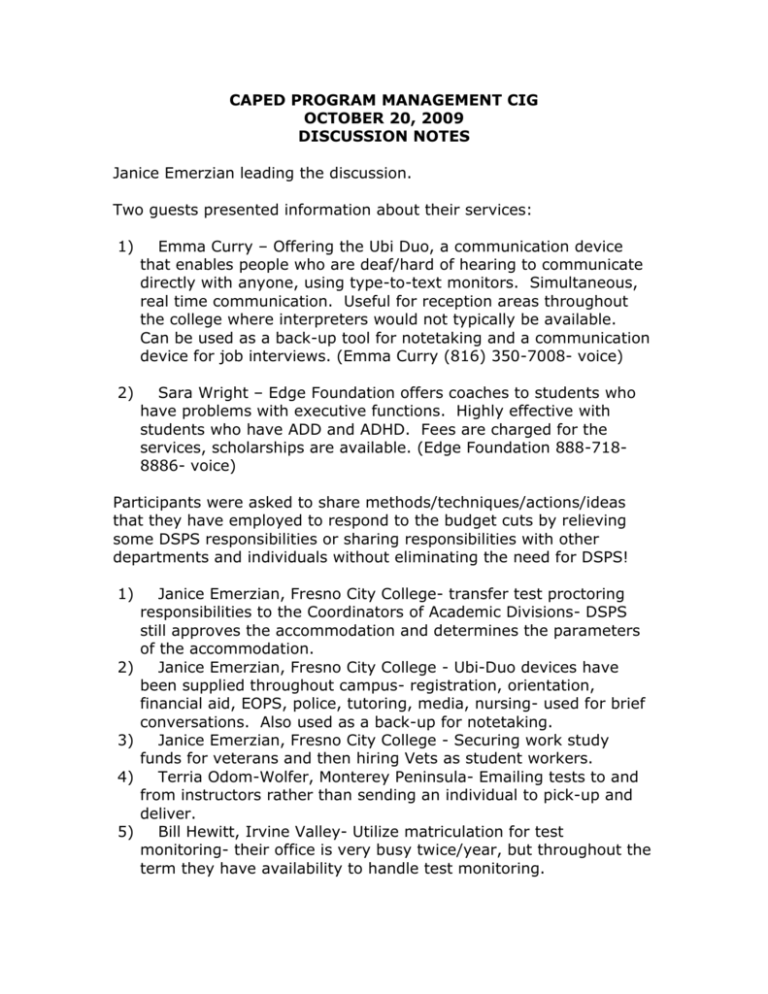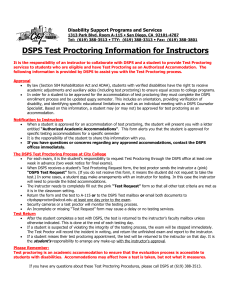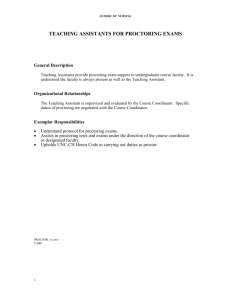CAPED Program Managers CIG on Budget Cuts
advertisement

CAPED PROGRAM MANAGEMENT CIG OCTOBER 20, 2009 DISCUSSION NOTES Janice Emerzian leading the discussion. Two guests presented information about their services: 1) Emma Curry – Offering the Ubi Duo, a communication device that enables people who are deaf/hard of hearing to communicate directly with anyone, using type-to-text monitors. Simultaneous, real time communication. Useful for reception areas throughout the college where interpreters would not typically be available. Can be used as a back-up tool for notetaking and a communication device for job interviews. (Emma Curry (816) 350-7008- voice) 2) Sara Wright – Edge Foundation offers coaches to students who have problems with executive functions. Highly effective with students who have ADD and ADHD. Fees are charged for the services, scholarships are available. (Edge Foundation 888-7188886- voice) Participants were asked to share methods/techniques/actions/ideas that they have employed to respond to the budget cuts by relieving some DSPS responsibilities or sharing responsibilities with other departments and individuals without eliminating the need for DSPS! 1) 2) 3) 4) 5) Janice Emerzian, Fresno City College- transfer test proctoring responsibilities to the Coordinators of Academic Divisions- DSPS still approves the accommodation and determines the parameters of the accommodation. Janice Emerzian, Fresno City College - Ubi-Duo devices have been supplied throughout campus- registration, orientation, financial aid, EOPS, police, tutoring, media, nursing- used for brief conversations. Also used as a back-up for notetaking. Janice Emerzian, Fresno City College - Securing work study funds for veterans and then hiring Vets as student workers. Terria Odom-Wolfer, Monterey Peninsula- Emailing tests to and from instructors rather than sending an individual to pick-up and deliver. Bill Hewitt, Irvine Valley- Utilize matriculation for test monitoring- their office is very busy twice/year, but throughout the term they have availability to handle test monitoring. 6) Bill Hewitt, Irvine Valley- Creation of “The One-Stop Categorical Center” through relocation of DSPS and EOPS to adjacent offices and cross-training of staff from both programs. 7) Jacquelin Hanselman, Copper Mountain- Setting up a secure site on the computer to email tests back and forth from instructors. 8) Inge Pelzer, Chaffey- Assigning campus grants office the responsibility to check on Stimulus funds coming through the Obama Administration. 9) Helene Maxwell, College of Alameda- Advocacy with the Board of Trustees to educate them about the budget cuts and the likely impact on services. 10) Helene Maxwell, College of Alameda- Trio grants will be coming out. However, the guidelines for Federal grants don’t always align with the community college system. Martha Kanter to be contacted to request that she be mindful that grant language be inclusive of community colleges. 11) Terri Goldstein, Long Beach City- Announcing that in the coming year there will be six types of TRIO grants which Directors need to be aware that they are applying for a category that is appropriate to their student population. 12) Janice Emerzian, Fresno City College- Utilization of funds through a STEM (Science, Technology, Engineering and Math) to add a DSPS Counselor. 13) Inge Pelzer, Chaffey – Partner with a business instructor and use projects from the Edge Foundation. 14) Jacquelin Hanselman, Copper Mountain- Conducting demonstrations of Alt Media- showing Kurzweil and JAWS and etext conversion to show the high level of work being done in the program. 15) Ardith Lynch, Saddleback- Evaluating test proctoring needs to determine what stays in the department and what can be shared with other departments. 16) Ardith Lynch, Saddleback- Looking at fee for services within the college. 17) Janice Emerzian, Fresco City- Recognition of interpreters as instructional support and attempt to have instruction to carry the costs. 18) Paul Miller, California State University, Fullerton - Consider that the college is responsible for providing services and go ahead providing them even if you run into debt. At the CSU, the college will pay at the end of the year. 19) Sherry D’Attile, Moorpark- Offering services to universitiesexample- Moorpark is providing DE test proctoring for Brigham Young University. 20) Sherry D’Attile, Moorpark- Advocacy with instructors and faculty senate- recognition that services are provided for them as well as the students. Explaining that the instructors would have to determine accommodation needs and arrange for them if the DSPS office did not handle this function. 21) Jan Galvin, Galvin Group- Helene Maxwell has developed an excellent PowerPoint presentation for their Board of Trustees. It is available on the Galvin Group website and can be modified to meet your district or college. 22) Helene Maxwell, College of Alameda- Be aware that trustees are politicians and have fiduciary responsibility- recommend showing them the difference between the cost of contracting out for services vs. providing services in-house. State law requires that 50% of funds in the district must go to instruction. AARA funds were intended to go to categorical programs, but are instead being sent to the general fund. Identify positions that could be categorized as instructional. 23) Bill Hewitt, Irvine Valley- AARA funds provide an opportunity for backfill by paying staff who are doing instructional work. Suggested review of articles found at FACCC.org that address the 50% law and categorical funds- consider positions such as test proctoring, interpreting, tutoring and student aides. If Counselors are faculty positions, strengthen relationship to instruction by teaching a class. Code interpreters as “instructional aides.” 24) Mary Lewis, retiree- Identify FTES being generated by students with disabilities in non-special ed classes. This demonstrates that we are generating income. 25) Paul Miller - California State University, Fullerton- CSUs are closed for new applicants- likely until November of next year. Transfer requirement is currently at 2.0 GPA, expected to go up to 2.8 GPA. 26) Janice Emerzian, Fresno City- Installation of an automated telephone system in the front office of DSPS. 27) Janice Emerzian, Fresno City- Additional funds in the financial aid office going to a part-time counselor to work with students with disabilities. 28) Kathleen Allen, Chabot- Will guaranteed transfer agreements to CSUs and UCs help? 29) Inge Pelzer, Chaffey- Eliminating some sections of some courses. 30) Lucinda Aborn, Cerritos- Reimbursement for Medicaid servicesMAA billing- more information at MBT4schools.com (in process) Have to be trained in the system, but can generate extra funds for the college. 31) Rick Scuderi, LA Mission- Our responsibility is to serve studentsadvocate with VP and Administration by demonstration of what you are doing. 32) Helene Maxwell, College of Alameda- Reminder that when considerations of undue burden are made, the financial situation of the entire institution is taken into consideration. One college was told that the football team was not mandated, while services to students with disabilities are required.







